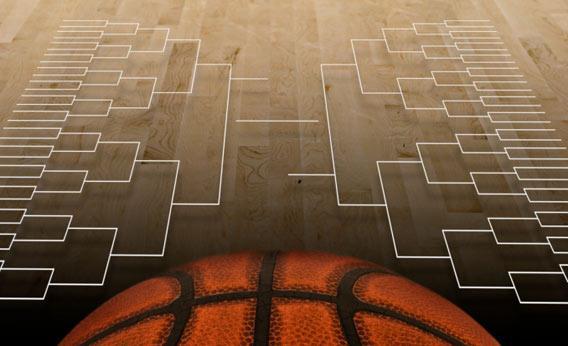Read more from Slate’s coverage of the NCAA tournament.
The annual NCAA Division I men’s basketball tournament, better known as “March Madness,” goes into overdrive today, as does the annual orgy of informal office-wide NCAA basketball gambling pools, better known as “this is probably illegal.” Billions of dollars are spent on bracket-based betting every March, with a fair portion of that sum likely coming from five-dollar bills tucked into manila envelopes discreetly marked “Pool Money.” In 2009, according to an MSN survey, an estimated 45 percent of Americans filled out at least one bracket, and it’s likely that the vast majority of those participants were non-sports fans who choose their teams based on nicknames, or uniform color, or other irrational criteria that make it especially aggravating when those people end up winning, as they so often do.
Are these pools actually illegal? Technically, yes: office basketball pools count as illegal bookmaking operations in most states. You’re in the clear if your office is located in Nevada, where sports wagering is legal; in Montana, where sports pools are legal as long as the house doesn’t take a cut; and in Vermont and Connecticut, where small-time pools among friends and colleagues are allowed. Pennsylvania is also considering laws that would legalize small-scale sports gambling pools.
The United States is fairly prudish about sports gambling in general. The Professional and Amateur Sports Protection Act of 1992 which outlawed sports wagering in all but four states. Oregon, Delaware, and Montana were allowed to run “sports lotteries”; Nevada is still the only state where you can lay down a straight wager on a variety of sporting events. (New Jersey has long wanted to legalize sports betting; however, in March, a federal judge ruled that the state was still subject to PASPA.)
Legislators are always talking about trying to repeal, amend, or otherwise get around this law, because sports betting is a big and lucrative business that, if legalized and regulated, could bring big money into state coffers. According to the American Gaming Association, in 2011, $2.88 billion was spent on sports wagering in Nevada alone—a figure that “represents less than 1 percent of all sports betting nationwide.” (This figure is obviously just a guess, as there’s no good way to accurately calculate the sums being wagered off the books sports.)
Some people have been penalized by their employers for organizing or participating in office pools while on corporate time. These are usually big-money affairs, though, not five-dollar-per-bracket pools. In the 1990s, according to New York, the chairman of Lehman Brothers sent a company-wide memo “declaring involvement in the [extremely high-stakes] NCAA pool a fireable offense,” thus giving the world yet another reason to hate Wall Street. In 2003, then-University of Washington football coach Rick Neuheisel was fired after the school learned he won more than $10,000 in a high-stakes NCAA tournament pool. (Neuheisel later won a $4.5 million settlement in a lawsuit against the NCAA and the university.)
If the feds are knocking on your door for March Madness-related reasons, you’re probably dealing in similarly hefty sums. For 30 years, starting in 1977, a Staten Island tavern called Jody’s Club Forest ran an NCAA tournament pool that paid out increasingly large sums; in 2006, the grand prize was $1.5 million. That drew the government’s attention, and in 2010, the bar’s owner, Joseph “Jody” Haggerty, pleaded guilty to tax evasion for failing to report the money he earned by running those pools. He got probation and was forced to pay $27,000 in back taxes and fines. He also suffered the humiliation of seeing all the hot March Madness action shift over to a bar called Dannyboy’s.
I was not, however, able to find any record of someone being prosecuted for spending five or 10 or 20 bucks on some friendly intra-office wagering. While the government has no problem prosecuting people for astoundingly minor crimes, NCAA tournament betting is so widespread that it’s not worth anyone’s time to investigate or pursue charges against individual bettors or small-stakes pool organizers. So you should probably feel free to participate in an office pool this year without fear of criminal repercussions. Just restrain your impulse to throttle the human resources lady who wins after choosing Butler to go all the way because she likes Downton Abbey. That is still a crime.
Crime is Slate’s crime blog. Like us on Facebook, and follow us on Twitter @slatecrime.
